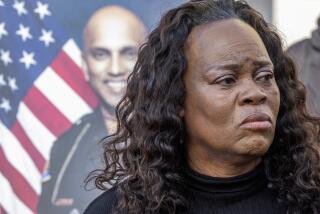Shooting Spurs Latinos to Reassess Law Enforcement
The fatal shooting of a Ramona Gardens youth by a sheriff’s deputy last weekend has inflamed historic tension and mistrust between East Los Angeles residents and law enforcement authorities.
Latino leaders who had been criticized for their silence about the police beating of Rodney G. King now are publicly demanding a thorough investigation of a case that has outraged many in the community.
“The black community was abandoned by Latino community leaders who were reluctant to raise the issue of police brutality, which is a shame,” said Gloria Romero, an assistant professor of psychology at Cal State Los Angeles and a member of the Hispanic Advisory Council to the Los Angeles Police Commission.
Now, she said, “The challenge facing Latinos is this: The Ramona Gardens case is the first major alleged incident of excessive force since the King incident. How are we going to respond?”
The question is being weighed across the city of Los Angeles, which is 40% Latino. The killing of 19-year-old Arturo Jimenez has become a main topic of conversation, from the modest $222-a-month apartments of the Ramona Gardens housing project in the Eastside to the wood-paneled conference rooms of Mexican American Legal Defense and Educational Fund offices in downtown Los Angeles.
The death of Jimenez has heightened Latino concerns about the community’s relationship with law enforcement agencies. It also has prompted Latinos to take a hard look at what their neighborhoods can expect from implementation of the Christopher Commission recommendations for ridding the Los Angeles Police Department of racism and excessive force.
Of particular interest are proposals that the Police Department revamp its complaint system, improve human relations and Spanish-language training for new recruits and expand community-oriented policing efforts that stress crime prevention.
“A few months ago, we focused on these issues in terms of the LAPD, but it is clear they overlap into other law enforcement agencies,” said Leo Estrada, a UCLA demographer and member of the Christopher Commission. “The Jimenez case requires that the public demand that Christopher Commission-like recommendations be applied across the board.”
Rosa Martinez, Mayor Tom Bradley’s liaison with the Latino community, agreed, saying, “The same scrutiny applied to the Police Department after the Rodney King incident must be applied to the Sheriff’s Department.”
Sheriff’s officials were not available for comment Wednesday.
Latino leaders have already begun developing strategies for monitoring the performance of law enforcement authorities--and compiling a list of qualified candidates to replace Police Chief Daryl F. Gates, who has said he will retire in April.
“More people are getting involved, speaking their piece and holding law enforcement agencies and bureaucrats accountable for their actions,” said Connie Armenta, a spokeswoman for the United Neighborhoods Organization.
In testimony before the Christopher Commission, Latinos complained that police officers show them little respect.
The same problem, Estrada said, was reflected in the commission’s study of squad car computer messages.
“Sgt. says tell them to go back to Mexico,” one officer messaged.
“Hi . . . just got mexercise for the night,” messaged another.
A Los Angeles Times Poll conducted in July found that 67% of Latino residents believed incidents of police brutality were very common in the city, while 85% of blacks and 54% of Anglos reached the same conclusion. The poll found that 35% of Latinos, 48% of blacks and 21% of Anglos felt that racist feelings among officers were very common.
For many Latinos, the Jimenez case unleashed frustration over confrontations with law enforcement authorities dating back to World War II, when flashily dressed Mexican-Americans clad in zoot suits were assaulted by sailors and rogue police officers in Los Angeles.
Jimenez was shot to death Saturday morning by a sheriff’s deputy who said the young man threatened him with a flashlight, after using it to knock out another deputy.
Witnesses, however, said it was the deputies who provoked the incident by striking a young man in a group celebrating the birthday of a resident. Jimenez, they said, began yelling at officers for punching his friend, but did nothing threatening.
The district attorney’s office and the Sheriff’s Department have launched separate investigations into the case.
A host of troubling questions raised by the incident--including why sheriff’s deputies were in an area normally patrolled by Los Angeles police--have prompted Latino community leaders to call for an independent civilian investigation similar to the one conducted in the King incident.
Joe Sanchez, a prominent East Los Angeles business leader, said he has been swamped with “calls from people who want us to ensure that this case gets the same attention the King case got from the Christopher Commission.”
Under pressure from Eastside residents, community leaders have made personal pleas for a tough stance from two Latino elected officials who were relatively quiet about the Rodney King affair--County Supervisor Gloria Molina and City Councilman Richard Alatorre.
Molina, who was a councilwoman when the King incident erupted in March, was out of the country and could not be reached for comment. But her aide, Robert Alaniz, said Molina found it hard to criticize Gates as the King case unfolded because the City Council had given him excellent reviews year after year.
Alaniz offered an additional reason for Molina’s relative silence about the King incident.
“When she went on the council she had an excellent relationship with Gates--when she needed him in terms of law enforcement issues in the 1st District he was always there,” Alaniz said. “So, she found it hard at that time to call for his resignation or ouster.”
On Monday, Molina and Alatorre injected themselves in the Ramona Gardens controversy.
That day, a representative from Molina’s office, community leaders and law enforcement officials including Undersheriff Robert Edmonds met behind closed doors at Alatorre’s City Hall office to discuss ways of averting a crisis at Ramona Gardens.
After the meeting, Alatorre drove to the housing project to tell 200 angry residents assembled in an auditorium there that the district attorney’s office was conducting “an independent investigation” into the case.
Father Juan Santillan of nearby St. Lucy’s Church said Alatorre had no choice but to deliver the message in person.
“The politicians have to come out here--it’s their constituents we’re talking about this time,” Santillan said. “We won’t let this issue die.”
More to Read
Sign up for Essential California
The most important California stories and recommendations in your inbox every morning.
You may occasionally receive promotional content from the Los Angeles Times.










